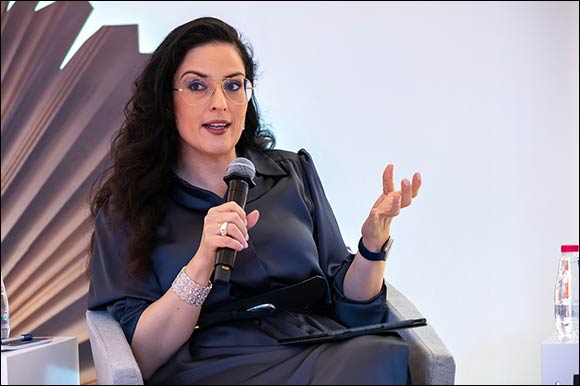Visitors attending the 41st edition of the Sharjah International Book Fair were taken on a metaphysical journey by one of the world’s most prominent theoretical physicists — Dr. Leonard Mlodinow.
The American intellectual is also a renowned mathematician, screenwriter for titles such as Star Trek: The Next Generation and author of multiple New York Times bestsellers, including books penned alongside other great minds, such as Steven Hawking and Deepak Chopra.
The forum hosted by the Sharjah Book Authority was moderated by Sally Mousa, a radio presenter, TEDx speaker and finalist at the Arab Woman Awards 2020, who introduced Dr. Mlodinow, and listed his multiple accolades and areas of expertise. Opening the discussion, Sally asked Mlodinow as he was growing up, what led him to becoming a physicist and person he is today.
Leonard responded, “Well, that’s a multi-hour and for a therapist, a multi-year question, but my earliest memories of being interested in physics was hearing about Einstein’s theories of ‘curved space’. I remember as a young boy, certainly before I was really old enough to really learn anything about the theory, just trying to imagine what that meant; ‘curved space’ and time. I write books, I write for TV and I write Popular Science books, I also am a physicist, and I think back to my childhood and see that all of those roots were there. I was interested in science for as long as I can remember and I wrote my first short story at the age of 8. So it’s not a passion that was discovered later, these are parts of the adult that were there as a child.”
Mlodinow expanded on his childhood and education saying, “I was the first person in my family not only to go to university but also to finish highschool. I was fortunate enough to have the opportunity to learn and lucky enough to have teachers that made tuition fun and interesting. If you go to a school that turns you off the learning process as so many schools do; especially in maths and science where teachers take kids that are interested in the subjects, and force these children to do boring and uninspired things and when they eventually graduate they think that maths and science is boring. I was lucky enough to not have that experience and have parents and teachers that let me do what I wanted within reason.”
As Mlodinow has written about everything, from the origins of the physical universe to how people function and think, Mousa asked the physicist which is more complicated, the universe or human beings? To which he responded with a chuckle, “Human beings are far more complicated than the universe, Einstein’s theory of general relativity, the theory that covers gravity, predicting black holes, how apples fall on earth, etc, can all be written down in just one line of mathematics, energy (E) equals mass (m) times the speed of light (c) squared (2), or E=mc2. A human can not be described that way,” he laughed.
Continuing, he said, “There are about 100 billion stars in our galaxy, the Milky Way, and on the other hand there are about 100 billion neurons in your brain but the stars aren’t really connected to each other directly, but each neuron in your brain is connected to thousands of other neurons and they communicate between each other. It’s much harder to describe the human brain than it is to describe the known universe,” to which Mousa responded, “it reminds me of the quote from Rūmī, who said, ‘The entire universe is inside you’.”
After being asked about his new book, Emotions, Mlodinow gave a breakdown of his take on the subject. “Emotions are a quality of your brain that evolved to help us make good decisions, to react quickly and efficiently to our environment in different situations, it’s totally wrong to think that emotions are counter productive and that you should try to just use your rational mind, which can’t do anyway, it’s literally impossible. But what is an emotion? Let’s look at what the brain does. The brain is an information processor, it’s like a computer, it doesn’t work quite like the computers we have today, but in a similar way it takes in data and processes this and produces an output, a decision, a thought or an idea. This is what your brain is doing constantly, but your brain processes so many things at the same time, it processes sensory information, information about your environment, but it’s also processing information from your past. So when your brain is making its calculations it’s using your prior beliefs, experiences, your goals, and it’s taking all that along with the sensory data and information about your current situation and it’s producing the decision or understanding. That is the output.”
He expanded on the concept and discussed his book further saying, “I used Einstein in my book because he said to be someone with very little emotion, but later in his life he realised that a lot of things that guided him in his decisions were emotions and the conclusions he came to were through emotional responses to the information, eventually giving the advice to young scientists that they should follow their emotions, follow their passions and emotional hunches, because physics just like your brain is not a cold and dry emotionless field. When you’re doing physics, most of what you want to do, you can’t do. Understanding and discovering things in physics is about decisions, what approximations to make, what assumptions you want to throw out there to solve the problem. It’s about ‘meta-decisions’ and these are much more reliant on your emotions and feelings.”















